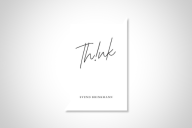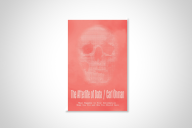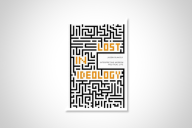You have /5 articles left.
Sign up for a free account or log in.
“All eras in a state of decline and dissolution are subjective,” said Goethe in a moment of sagely grumbling about the poets and painters of the younger generation, who, he thought, confused wallowing in emotion for creativity. “Every healthy effort, on the contrary, is directed from the inward to the outward world.”
I didn’t make the connection with Svend Brinkmann’s book Stand Firm: Resisting the Self-Improvment Craze until a few days after writing last week’s column about it. One recommendation in particular from the Danish author’s anti-self-help manual seems in accord with Goethe’s admonition. As Brinkmann sees it, the cult of self-improvement fosters a kind of bookkeeping mentality. We end up judging experiences and relationships “by their ability to maximize utility based on personal preferences -- i.e. making the maximum number of our wishes come true.” The world becomes a means to the ego’s narrow ends, which is no way to live.
Besides offering a 21st-century guide to the Stoic ethos of disinvestment in the self, Brinkmann encourages the reader to rediscover the world in all its intrinsic value -- its fundamental indifference to anybody’s mission statement. How? By spending time in museums and forests:
“A museum is a collection of objects from the past (near or distant), e.g. art or artifacts that say something about a particular era or an aspect of the human experience. Obviously, you learn a lot from a museum visit -- but the greatest joy lies in just reveling in the experience with no thought of how to apply the knowledge and information. In other words, the trick is to learn to appreciate things that can’t be ‘used’ for some other function....
Similarly, a walk in the woods gives us a sense of being part of nature and an understanding that it shouldn’t be seen as consisting of resources that exist merely to meet human needs and desires. ... There are aspects of the world that are good, significant, and meaningful in their own right -- even though you derive nothing from them in return.”
Making similar points from a quite different angle is The Usefulness of Useless Knowledge by Abraham Flexner (1866-1959), the founding director of the Institute for Advanced Study, in an edition from Princeton University Press with a long introduction by the institute’s current director, Robbert Dijkgraaf.
The essay giving the book its title first appeared in Harper’s magazine in October 1939 -- a few months into the New York World’s Fair (theme: The World of Tomorrow) and just a few weeks into World War II. “I [am] pleading for the abolition of the word ‘use,” Flexner wrote, “and for the freeing of the human spirit.” It must have seemed like one hell of a time for such an exercise. But the essay’s defense of the Ivory Tower was tough-minded and far-sighted, and Dijkgraaf’s introduction makes a case for Flexner as a major figure in the history of the American research university whose contribution should be remembered and revived.
The germ of The Usefulness of Useless Knowledge was a memorandum Flexner wrote as executive secretary of the General Education Board of the Rockefeller Foundation in 1921.The principles it espouses were also expressed in his work bringing Albert Einstein and other European academic refugees to the Institute at Princeton in the early 1930s.The essay defends “the cultivation of beauty ... [and] the extension of knowledge” as “useless form[s] of activity, in which men [and, as he acknowledges a few sentences earlier, women] indulge because they procure for themselves greater satisfactions than are otherwise available.”
But the impact of Flexner’s argument does not derive primarily from the lofty bits. He stresses that the pursuit of knowledge for its own sake has in fact shown itself already to be a powerful force in the world -- one that the ordinary person may not be able to recognize while swept up in “the angry currents of daily life.” The prime exhibits come from mathematics (Maxwell’s equations or Gauss’s non-Euclidian geometry took shape decades before practical uses could be found for them), though Flexner also points to the consequential but pure curiosity-driven work of Michael Faraday on electricity and magnetism, as well as Paul Ehrlich’s experiments with staining cellular tissue with dye.
“In the end, utility resulted,” Flexner writes, “but it was never a criterion to which [researchers’] ceaseless experimentation could be subjected.” Hence the need for institutions where pure research can be performed, even at the expense of pursuing ideas that prove invalid or inconsequential. “[W]hat I say is equally true of music and art and of every other expression of the untrammeled human spirit,” he adds, without, alas, pursing the point further.
The untrammeled human spirit requires funding in any case. Although written towards the end of the Great Depression -- and published ten years to the month after the stock market crash -- The Usefulness of Useless Knowledge reads like a manifesto for the huge expansion of higher education and of research budgets in the decades to follow.
Flexner could point to the Institute for Advanced Study with justified pride as an example of money well-spent. He probably corrected the page proofs for his essay around the same time Einstein was writing his letter to President Roosevelt, warning that the Germans might be developing an atomic bomb. And as Robbert Dijkgraaf reminds us in his introduction, another Flexner appointee was the mathematician John von Neumann, who “made Princeton a center for mathematical logic in the 1930s, attracting such luminaries as Kurt Godel and Alan Turing.” That, in turn, led to the invention of an electronic version of something Turing had speculated about in an early paper: a machine that could be programmed to prove mathematical theorems.
“A healthy and balanced ecosystem would support the full spectrum of scholarship,” Dijkgraaf writes, “nourishing a complex web of interdependencies and feedback loops.” The problem now is that such a healthy and balanced intellectual ecosystem is no less dependent on a robust economy in which considerable amounts of money are directed to basic research -- without any pressing demand for a return on investment. “The time scales can be long,” he says, “much longer than the four-year periods in which governments and corporations nowadays tend to think, let alone the 24-hour news cycle.”
That would require a culture able to distinguish between value and cost. Flexner’s essay, while very much a document from eight decades ago, still has something to say about learning the difference.








